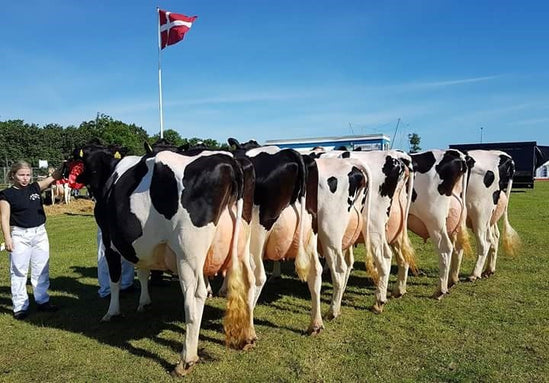Nigeria has embarked on an ambitious project to import Danish dairy cattle, with plans to double the nation’s milk production over the next five years. This strategic move comes in response to the growing demand for milk and dairy products in Nigeria, where local production has historically struggled to keep pace with needs.
Nigeria, Africa’s most populous country, has seen a surge in population and urbanization, leading to increased consumption of dairy products. However, despite having vast agricultural potential, the nation has been heavily reliant on imported dairy products to satisfy its needs. In light of this, the Nigerian government recognized the urgent need to develop a sustainable local dairy industry that could meet domestic demands while creating jobs and fostering economic growth.
To achieve this goal, Nigerian agricultural officials turned their attention to Denmark, known for its advanced dairy farming practices and high-quality livestock. Danish Holstein cattle, renowned for their high milk yield and adaptability, were identified as the ideal breed for Nigeria’s diverse climate conditions.
In collaboration with Danish agricultural experts and livestock breeders, Nigeria has begun the importation of thousands of these prized cows. The initiative not only focuses on quantity but also emphasizes quality—by introducing superior genetics, Nigerian farmers are expected to achieve significant increases in milk yield per cow.
To ensure the success of this program, a key component involves extensive training for local farmers. Workshops and seminars conducted by Danish experts are being held across rural communities to educate farmers on modern dairy farming techniques, animal husbandry, and sustainable practices. This capacity building aims to empower local farmers, increase productivity, and ultimately improve livelihoods.
The importation of Danish dairy cattle is projected to have a profound impact on the Nigerian economy. With the anticipated doubling of milk production, the country is expected to reduce its dependence on foreign dairy products, saving valuable foreign exchange. Additionally, the initiative is forecasted to create thousands of jobs in farming, processing, and distribution sectors, particularly in rural areas where unemployment rates are high.
The initiative also prioritizes environmental sustainability. Danish farming practices are recognized for their commitment to environmentally friendly methods. By adapting these practices, Nigeria aims to develop a dairy industry that respects ecological balance while meeting the growing demand for dairy products.
The project has garnered enthusiasm among local farmers and communities. “This is a game-changer for us,” says Fatima Abubakar, a dairy farmer in Kaduna State. “With the new cattle and the training we receive, we can finally produce enough milk to support our families and contribute to our local economy.”
As Nigeria embarks on this journey, the government has set ambitious targets. By 2028, officials aim for the country to be self-sufficient in dairy production, with plans to export surplus products to neighboring countries. The collaboration with Denmark is just the beginning; more partnerships with international agricultural bodies are being explored to further enhance the capacity of Nigeria’s dairy industry.
In conclusion, Nigeria’s importation of Danish dairy cattle marks a significant step toward transforming its dairy sector. With a focus on quality, sustainability, and education, this initiative holds the promise not only of improved milk production but also of a brighter economic future for the nation’s farmers and communities.


